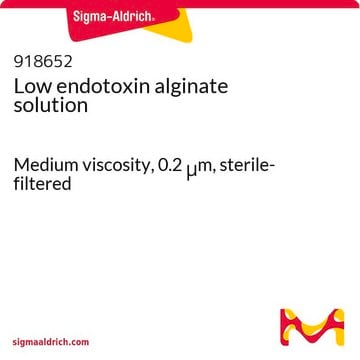919373
Low endotoxin alginate
Medium viscosity
Sinónimos:
Alginic acid, Sodium alginate
Iniciar sesiónpara Ver la Fijación de precios por contrato y de la organización
About This Item
UNSPSC Code:
12352201
NACRES:
NA.23
Productos recomendados
Quality Level
form
lyophilized powder
impurities
<10 CFU/g Bioburden
<100 EU/g Endotoxin
color
white to pale yellow
storage temp.
2-8°C
Application
This product is low endotoxin version alginate, it is lyophilized powder and ready to be used in biomedical applications.
Alginate is an anionic polysaccharide that is widely used in pharmaceutical and biomedical applications due to its non-animal origin, low toxicity, biocompatibility, and biodegradability. Alginate hydrogels are commonly used to fabricate tissue engineering scaffolds, bioinks for 3D bioprinting, and nanocarriers for drug & gene delivery. Alginate is commonly crosslinked into a hydrogel via ionic-crosslinking with divalent cations (e.g., Ca2+).
Alginate is an anionic polysaccharide that is widely used in pharmaceutical and biomedical applications due to its non-animal origin, low toxicity, biocompatibility, and biodegradability. Alginate hydrogels are commonly used to fabricate tissue engineering scaffolds, bioinks for 3D bioprinting, and nanocarriers for drug & gene delivery. Alginate is commonly crosslinked into a hydrogel via ionic-crosslinking with divalent cations (e.g., Ca2+).
Packaging
500mg in glass bottle
Storage Class
13 - Non Combustible Solids
wgk_germany
WGK 2
Elija entre una de las versiones más recientes:
Certificados de análisis (COA)
Lot/Batch Number
¿No ve la versión correcta?
Si necesita una versión concreta, puede buscar un certificado específico por el número de lote.
¿Ya tiene este producto?
Encuentre la documentación para los productos que ha comprado recientemente en la Biblioteca de documentos.
Jia Jia et al.
Acta biomaterialia, 10(10), 4323-4331 (2014-07-08)
Recent advances in three-dimensional (3-D) printing offer an excellent opportunity to address critical challenges faced by current tissue engineering approaches. Alginate hydrogels have been used extensively as bioinks for 3-D bioprinting. However, most previous research has focused on native alginates
Eneko Axpe et al.
International journal of molecular sciences, 17(12) (2016-11-30)
Three-dimensional (3D) bioprinting is on the cusp of permitting the direct fabrication of artificial living tissue. Multicellular building blocks (bioinks) are dispensed layer by layer and scaled for the target construct. However, only a few materials are able to fulfill
Kuen Yong Lee et al.
Progress in polymer science, 37(1), 106-126 (2011-11-30)
Alginate is a biomaterial that has found numerous applications in biomedical science and engineering due to its favorable properties, including biocompatibility and ease of gelation. Alginate hydrogels have been particularly attractive in wound healing, drug delivery, and tissue engineering applications
Tarun Agarwal et al.
ACS applied materials & interfaces, 8(47), 32132-32145 (2016-12-10)
Success of bone tissue engineering (BTE) relies on the osteogenic microarchitecture of the biopolymeric scaffold and appropriate spatiotemporal distribution of therapeutic molecules (growth factors and drugs) inside it. However, the existing technologies have failed to address both the issues together.
Nuestro equipo de científicos tiene experiencia en todas las áreas de investigación: Ciencias de la vida, Ciencia de los materiales, Síntesis química, Cromatografía, Analítica y muchas otras.
Póngase en contacto con el Servicio técnico






